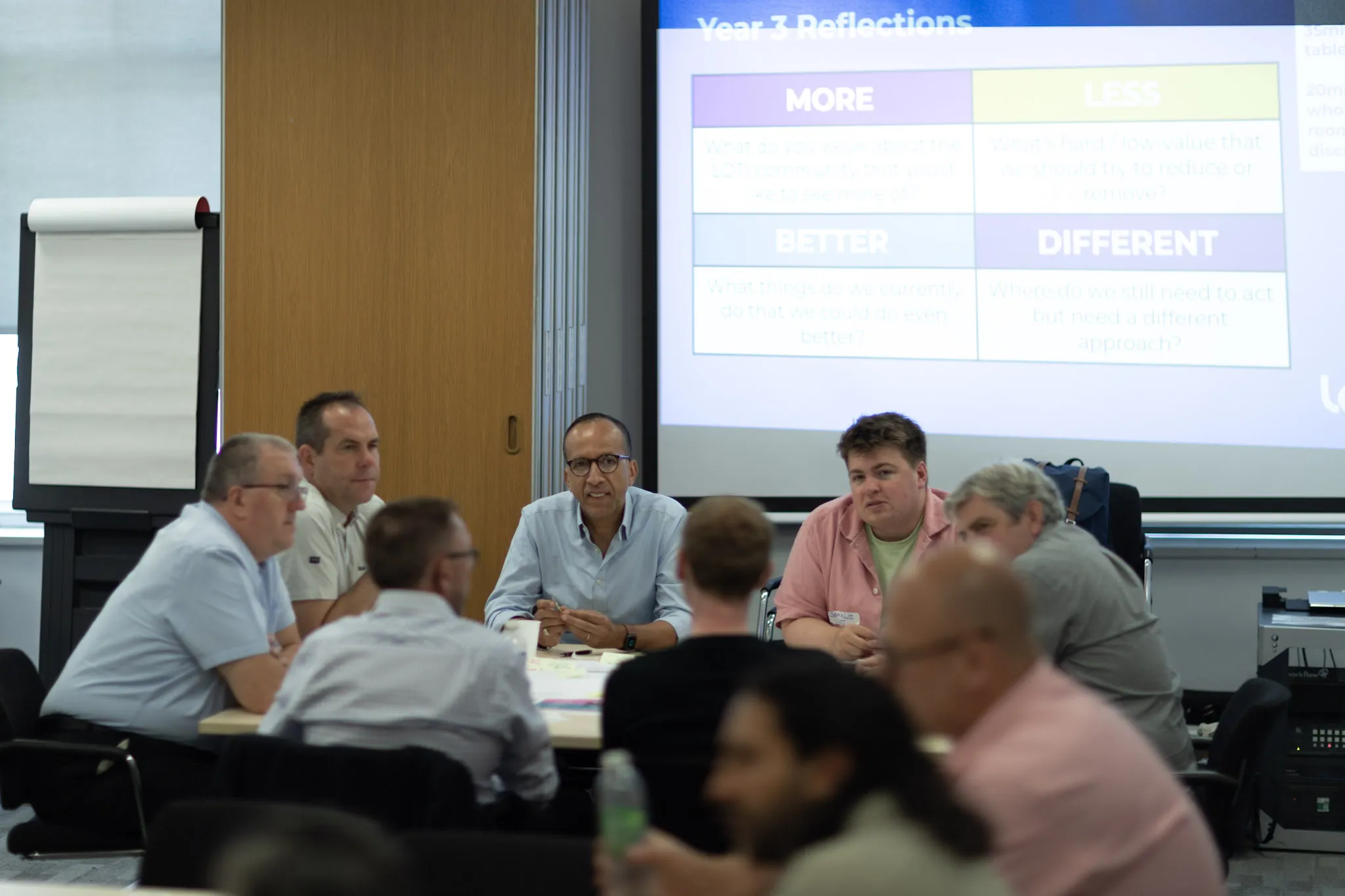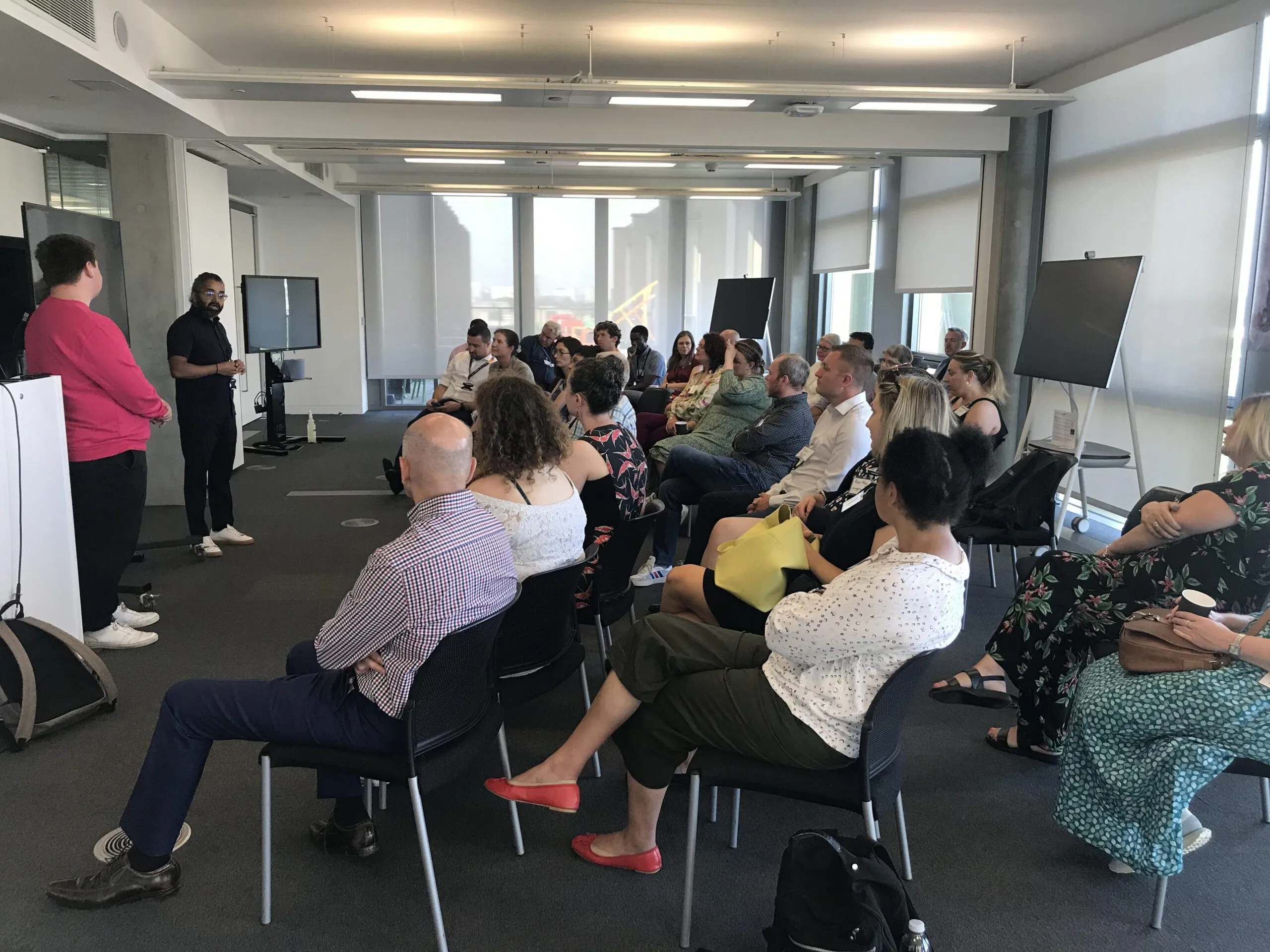1 year at LOTI, or, how I learned to be an action researcher
When I arrived at LOTI one year ago, I thought I had a good grasp of what it meant to do impactful research. “We don’t write reports to sit on bookshelves” was the mantra from my previous job. Even within the organisation, relative to my peers, I always felt my reports on Global Trends in public sector innovation were written to be read.
This was perfect, because LOTI is all about impact. Our ‘outcomes-driven methodology’ is key to this, ensuring that whatever decisions we make are always in service to the positive outcomes that we ultimately want residents to experience via their local councils.
Well, after a year at LOTI, my understanding of how the purpose of research and analysis should inform the design of that work has massively changed, ultimately due to the reflective learning we practice as part of that outcomes-driven method. Doing collaborative research across and for many different organisations simultaneously has opened my eyes to how this isn’t just your typical research role, but actually something with far greater potential.

The unique nature of collaborative research at LOTI
Doing research in a collaboration and innovation unit is a unique positional context. In one sense that I am very conscious of, I’m free of the day-to-day pressures that face many borough officers, meaning that I can spend time (on their behalf) doing more desk-based and horizon-scanning research, and I’ve particularly done this through my (irregular) Reading of the Week. Equally, it gives me a great position to be able to affect change in multiple and different organisations, who want different types of information and insight.
However, one element I’ve always been aware of is ‘who I learn from’. Innovation in government doesn’t just happen in a ‘digital’ or innovation team, but across organisations in different policy or service areas. How then, do you research the different staff in 25 organisations, when you don’t know who they are and they have their own silos? Do directors or heads of service always have the relevant insight that I want to surface? The answer to this second question is clearly no. For example, consider the difference in responses to interviewing an HR professional who designed a return to office programme versus an officer working in housing policy: they will offer vastly different perspectives.
This is not a challenge though, but a wonderful opportunity. In my position as a LOTI researcher I am able to go in, and with a little bureaucratic navigation, access different people without prejudice, borough staff with different experiences and perspectives that are all fundamentally valuable to innovation.
A hurdle to so much public sector innovation and collaboration is simply finding people’s time, when they are so time-scarce and dealing with urgent priorities. Most officers do not have “spend a portion of your working week contributing to collaborative learning with other boroughs” in their job description. So, even if they say your work is valuable, they might struggle to find the time to engage. The lesson is that if you are the facilitator or convenor of collective learning, you have to make it as enticing to people as possible. That might mean making it is as obvious as possible to Officers about how they can benefit from engaging with you. Or it can be as simple as making sure your events have really good hot food!
Outcomes-driven research
On that, what is it that those people actually want to get from my research? Well, it isn’t anything long, and they certainly don’t care about the quality of my prose. From my conversations this year, I’ve boiled it down to four things:
- Understanding how their organisation compares to peers;
- Learning about good practice from other boroughs (or beyond);
- Relevant research findings that they weren’t aware of;
- Practical and applicable recommendations or advice that they can directly apply in their current work.
Under our LOTI outcomes-driven methodology, then, I need to design my research in a way that maximises those above outcomes. This demands a reflection on what is the best type of research ‘product’ to create, and the best way to share that. Is it a set of guides? Is it a show and tell or a webinar? Is it a report? You have to be agnostic about the available forms, in order to decide which is the best fit for what type of above learnings you are trying to get across.
Or, maybe the best solution as a researcher isn’t even for you to do the sharing. In the case of my Future Workplace research, one of my key learnings was that pictures or text don’t fully capture the physical transformations of office space that have happened in the past couple of years. Putting this idea into practice, I designed our Innovative Offices tour, so that Officers from over 20 boroughs could actually experience in person a curated set of innovative workspaces, learn by being in the space and asking questions directly, as a group, to those who designed those spaces.

Even if you are to write a report, there are better and worse ways of writing it. Shorter and more concise is obviously preferred. However, sometimes you do need to convey a more lengthy set of ideas. Even in those moments though, the key is always writing and designing the report with the reader in mind. I’ve been lucky to learn from other good writers, like in my previous job, where my line manager Jamie Berryhill, who I co-wrote with and could learn from, had such an excellent and clear writing style that he took into all our reports. I still remember reading a primer on blockchain in the public sector before I applied there, and thinking, this person has better and more simply explained a complex technology than anywhere else I’ve seen.
Beyond clarity of language, one nice idea that I came across in an Ada Lovelace Institute report was not just to have a summary page, but a two-side ‘How To Read This Report’ guide for different types of readers. (Incidentally, two of the authors Jenny Brennan and Aidan Peppin started an excellent ‘Research as Craft’ newsletter that I’d recommend to other researchers!)
Lastly, perhaps under an illusion of an ‘objective-and-neutral-but-invisible writer’, I feel traditional research often fails to best imagine how to employ style and rhetoric. It’s not just about not-using academic jargon. If you believe in the quality and evidence-base of your recommendations, it’s on the researcher to convince the audience to adopt them. This may mean varying the level of persuasiveness depending on the audience’s openness to your ideas (particularly important when proposing riskier innovations). It may mean leaning into hard stats for some audiences, or personal stories for others. It means taking different tones with senior staff, or politicians, or front-line workers, or middle-management officers. These are all important weapons in the arsenal of creating actionable knowledge.
Being an action researcher
All of these ideas together culminated in me reimagining my role as an action researcher. Action research is no new field, first coined in 1946 by psychologist Kurt Lewin. It purports to “reflect thought, discussion, decision and action by ordinary people participating in collective thought” (Adelman, 1992: 3). I need to be able to access the (sometimes ignored by those concerned with public sector innovation) ordinary employees, empower them to think as innovators, changemakers, and facilitate collective reflection.
Whilst this doesn’t materially change how I do my role, it has crystalised for me the purpose and place of my research. With this lens, my role is almost stewarding the collective production of actionable knowledge. Every decision I make as a researcher considers what knowledge might generate what action, how that knowledge should look and be shared, and how the right actions can produce the right knowledge.
This next year at LOTI, my focus is therefore on furthering the action that comes from my research. Whether it be on data ethics, digital democracy and innovative resident engagement, social care, or the host of other topics I get to think about, I want to get even better at doing research that has a positive impact for our members, and ultimately, for people in London.
Sam Nutt


